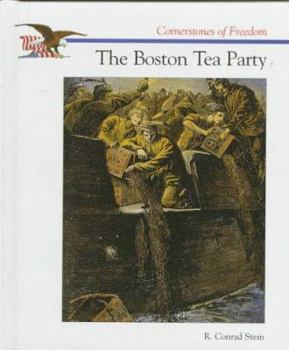Book Overview
Dramatic and defining moments in American history come vividly the life in the Cornerstones of Freedom series. This description may be from another edition of this product.
Format:Hardcover
Language:English
ISBN:0516200054
ISBN13:9780516200057
Release Date:September 1996
Publisher:Children's Press(CT)
Length:30 Pages
Weight:0.05 lbs.
Dimensions:0.3" x 8.3" x 9.8"
Age Range:9 to 11 years
Grade Range:Grades 4 to 6
Customer Reviews
1 rating
The complete historical context for the "Tea Party"
Published by Thriftbooks.com User , 16 years ago
As a physical act of rebellion, the event now known as the Boston Tea Party was not significant. However, as a symbolic event, it was powerful. Taxation by the British Crown was the point around which the American colonists were united in their opposition to the British throne. The last remaining tax was on tea and by that time the colonists were firm in their opposition to taxes of any kind. Therefore, when the "Indians" boarded the ships and threw the tea into Boston harbor, people throughout the colonies cheered the event. The British over-reacted to the event, closing Boston Harbor and stationing thousands of troops in the city. It generated sympathy for Boston and created additional fuel for the men who were leading the movement to declare independence from Britain. Although it is a historical consensus that public opinion at the time of the American Revolution was 1/3 in favor of independence, 1/3 neutral and the remaining 1/3 strongly pro-British, that fact is generally ignored in the history books. Not so in this one, Stein does an excellent job in setting the historical context for the Tea Party, including the grievances that the colonists had and their reaction to British actions. The Tea Party was much more than a single event; it was the culmination of a series of actions on both sides that were uniting a disparate group of people into a singular cause. The people were dropping their primary loyalties to their colony and the British crown and replacing it with a singular loyalty to America. When that happened, the revolution was inevitable and Stein does an excellent job in chronicling these events.





